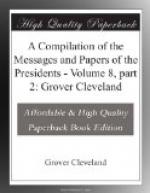2. The bank as proposed to be constituted can not be relied on during the war to provide a circulating medium nor to furnish loans or anticipations of the public revenue.
Without a medium the taxes can not be collected, and in the absence of specie the medium understood to be the best substitute is that of notes issued by a national bank. The proposed bank will commence and conduct its operations under an obligation to pay its notes in specie, or be subject to the loss of its charter. Without such an obligation the notes of the bank, though not exchangeable for specie, yet resting on good pledges and performing the uses of specie in the payment of taxes and in other public transactions, would, as experience has ascertained, qualify the bank to supply at once a circulating medium and pecuniary aids to the Government. Under the fetters imposed by the bill it is manifest that during the actual state of things, and probably during the war, the period particularly requiring such a medium and such a resource for loans and advances to the Government, notes for which the bank would be compellable to give specie in exchange could not be kept in circulation. The most the bank could effect, and the most it could be expected to aim at, would be to keep the institution alive by limited and local transactions which, with the interest on the public stock in the bank, might yield a dividend sufficient for the purpose until a change from war to peace should enable it, by a flow of specie into its vaults and a removal of the external demand for it, to derive its contemplated emoluments from a safe and full extension of its operations.




